Share
Working at ESO
Are you interested in working in areas of frontline technology and in a stimulating international environment? Do you feel your profile matches our requirements? Learn more about our current vacancies and apply online. Read more..
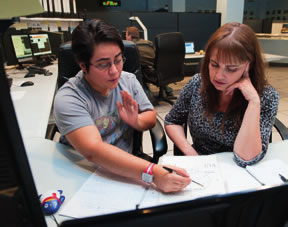
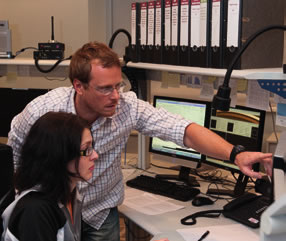
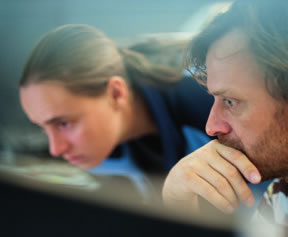
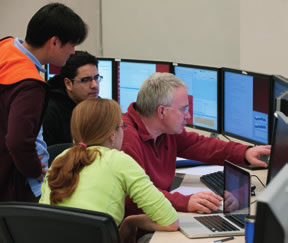
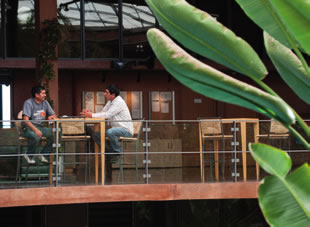
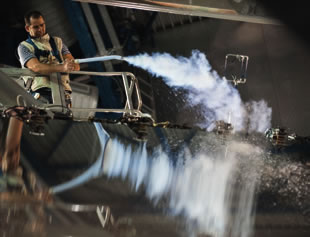
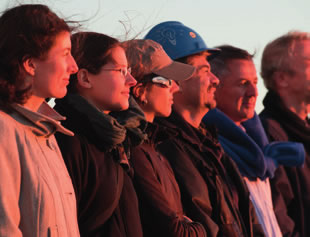
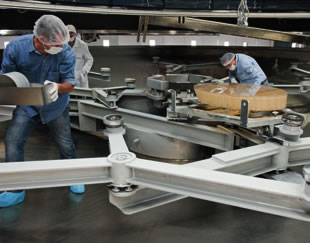
The European Organisation for Astronomical Research in the Southern Hemisphere (ESO) is the foremost intergovernmental astronomy organisation in Europe and the world's most productive ground-based astronomical observatory. ESO carries out an ambitious programme focused on the design, construction and operation of powerful ground-based observing facilities enabling astronomers to make important scientific discoveries. ESO operates three unique world-class observing sites in northern Chile: La Silla, Paranal and Chajnantor (home to ALMA and APEX), and the ESO Headquarters are located in Garching, near Munich, Germany.
For its Paranal Observatory (located 100 km south Antofagasta) and for its APEX site (located near San Pedro de Atacama) ESO is inviting students from Chilean universities to participate in our programme:
Summer Students Chile 2022
Paranal
Deadline 22/11/2021
For Summer 2022, ESO is opening summer students internships for three departments:
The Maintenance, Support and Engineering department (MSE): provides technical support to the four VLT 8-m telescopes, to the VLT Interferometer with its auxiliary telescopes and to all instruments available for scientific observations. The MSE Department of Paranal has a total workforce of 80 engineers and technicians distributed in 6 engineering groups. References for MSE Dpt. http://www.eso.org/sci/facilities/paranal/paranalenginternship.html
I. Project: M1 cell cooling lines and Industry 4.0 sensing upgrade (Mechanics group)
II. Project: Natural Languaje Processing for Problem Troubleshooting (Software group)
III. Project: Conditional maintenance Strategy (Support & Quality Assurance group)
IV. Project: CCD and Cryostat TeePee Interconnection - FIERA2NGC project (Instrumentation Group)
V. Project: Study and simulation of Altitude and Azimuth motors filtering system and current logging. (Electronic Group)
VI. Project: Short-circuit current calculation (Electronic Group)
The Science Operations department (PSO): is responsible for the execution of all scheduled observations and the production of astronomical data of highest quality. The department is further charged to maintain and whenever possible improve the scientific and operational performances of the Paranal instruments and systems. The PSO department has a total workforce of about 50 staff, divided roughly half-and-half into astronomers and telescope operators. Furthermore, a dozen postdoctoral fellows in astronomy support the science operations.
VII. Project: Development of the quality control framework SCUBA
VIII. Project: FORS2@VLT: Improvement of quality control for scientific data
IX. Project: Clouds and Precipitation Detection using Water Vapour Radiometer Data
X. Project: MUSE@VLT: NFM AO Performance assessment and PSF reconstruction with the new IRLOS+
The Atacama Pathfinder Experiment (APEX): This is a world-class millimetre & sub-millimetre observatory located at the so-called Chajnantor plateau, on the Chilean Andes. This is an ideal place with outstanding weather conditions for this type of observations. The APEX project is a collaboration among different European partners and hosted in Chile. The telescope has been in operation for more than 15 years and has evolved since its construction and the start of its operations. Given the experimental nature of the project, a large variety of instruments are available, some of them very versatile and for general use, and some other more experimental. APEX employs around 20 staff members between engineers, scientists, and support staff.
XI. Project: Observing Projects Phase 2 Submission Tool
XII. Project: Sequitor Base Infrastructure Renovation
We offer
ESO offers a special allowance during the period you are performing your internship with us, plus transportation arrangements (plane tickets) from and to Santiago with accommodation on site when the presence on site is required for the completion of a project. During summer 2022, it is expected that the majority of the projects will be performed remotely, with a possibility to visit the Vitacura offices. Depending on the nature of the project and the COVID restrictions applying at ESO at the time of the internship, shifts 8/6 at Paranal and Apex could be possible.
Application
We invite all students from Chilean Universities in an advanced stage of their career to apply. The apprenticeship should be supported by the University and therefore covered by the accident insurance (Law 16.744).
If you are interested in working in areas of frontline technology and in a stimulating international environment, you are invited to apply online at http://recruitment.eso.org/.
If you missed our webinar, check the presentation here: https://europeansouthernobservatory-my.sharepoint.com/:b:/g/personal/alejandra_mena_eso_org/Ee6Y7fhZ7hhKkhyaUVHHll0BmYqbrO9cMtz4xVL2hf0YzA?e=Fnouud
Applications must be completed in English and should include a motivational letter indicating the project(s) you are interested to apply to, and CV.
Closing date for applications is 22 November 2021.
The post is equally open to suitably qualified candidates irrespective of nationality, gender, age, disability, ethnicity, or religion.
List of Internship projects:
I. Project: M1 cell cooling lines and Industry 4.0 sensing upgrade
Paranal / MSE / Mechanics group
From 1 February to 31 March 2022
The UTs M1 cells cooling lines are made of PVC pipes and fittings, with no automated sensing/monitoring. Along the years these lines suffered cracks and leaks, which were not easy to repair and sometimes represented possible risks of cooling contamination for instruments and other telescope equipment like the hydrostatic bearing system. The cooling diagram original design should be improved to ease the cooling balance, and the distribution to the various utilities. Similarly, the actual sensing/monitoring of cooling parameters is poor and does not facilitate the early detection of cooling problems and the troubleshooting. An upgrade of the M1 cell cooling installation is foreseen for the coming years and a preliminary study would be needed.
Objectives
The project aims to evaluate industrial grade hardware solutions for a future cooling upgrade keeping in mind the following main objectives:
- Substitute the PVC pipes with sturdy, leak proof and reliable piping (stainless steel for example)
- Identify suitable fittings in order to ease the installation and future repair.
- Implement remote sensing and monitoring capabilities for the most important cooling parameters (pressure, flow, temperature) on the most critical cooling utilities like the electronic cabinets.
- Quantify the resources in terms of money and manpower to upgrade the cooling lines in one UT.
- Draft a preliminary design of the upgraded cooling lines.
Student Profile
- Mechanical engineer student (execution or civil) with proficiency in use of Autodesk Inventor tool (and piping module) and AUTOCAD.
- Knowledge on cooling and/or hydraulic circuits.
- Basic knowledge of metrology and measuring instruments.
- Good English (spoken and written) to contact national and foreign providers and to write technical documents
II. Project: Natural Language Processing for Problem Troubleshooting
Paranal / MSE / Software group
From 1 January to 8 March 2022
During the operation of Paranal, their instruments generate megabytes of daily operational data in the form of univariate time series, software logs, and problem report written by hand, which are analyzed by a team of engineers specialized in their respective disciplines to detect anomalies, find and predicts errors, and get general insights in order to keep the down time under control. The analysis of this huge amount of operational data must be aided by sophisticated data tools to automatize and enhance the analysis from new fields related to Data Science: Data Engineering, Machine Learning and Artificial Intelligence. An emerging area is the use of Natural Language Processing (NLP) to exploit the text nature of both software logs and problem reports. For example, sentiment analysis can be used to classify an observation into "success" or "error"; also, topic modelling can be used to relate different keywords to predict an error before the end of the observation. This internship seeks for a skilled student to test some of the NLP techniques and help in the setup of a workflow based in those techniques to be used daily by the technical team.
Objectives
- Select and evaluate three NLP techniques to characterize and predict failures.
- Sentiment Analysis, using Naive Bayes.
- Topic Modelling, using LDA.
- Deep Learning (Transformers, LSTM, etc.)
- Implement the successful techniques in Jupyter Notebooks ready to be used in daily operation.
- Collaborate in the development of the analysis framework which will be used as an alert system for MSE engineers in a central place.
Student Profile
- Software engineer, mathematical engineer or related
- Proven experience in data analysis using pandas, numpy, matplotlib, Jupyter, GIT.
- Desirable experience or knowledge in any of scikit-learn, TensorFlow, Hugging Face, plotly, plotnine, NLP, Machine Learning, and general Python development.
- Self-motivated and ability to perform a goal-based work.
III. Project: Conditional maintenance Strategy
Paranal / MSE /Support & Quality Assurance group
January and February 2022
Within the Integrated Operations Programme (VLT and ELT) framework, it is required to implement pilot tests of the condition-based maintenance strategy in the Maintenance, Support and Engineering Department (MSE). The objective is to develop the documentation of the selected system and to be able to deliver recommendations that point to the optimization of the strategy.
Objectives
- Study and understand the methodology for the use of condition-based maintenance defined in Paranal.
- Collect data and promote a pilot application for a system of interest.
- Develop related documentation related to the Paranal Integrated Operations Programme.
- Deliver a report about what was done (problems, steps, benefits, recommendations)
- To provide a presentation to the SQA group and other stakeholders.
Student Profile
- Student of industrial, mechanical, or electrical engineering of the last year of career, preferable.
- Able to read through documentation and a SW application in English
- Knowledge in SQL data base.
- Desirable: Knowledge previous experience with any CMMS (Computerized Maintenance Management System),KPI and Dashboard, Maintenance Strategies.
IV. Project: CCD and Cryostat TeePee Interconnection - FIERA2NGC project
Paranal / MSE /Instrumentation Group
January to middle March 2022
As part of the obsolescence plan, the detectors readout electronics systems currently used in the first Instruments generation of the Paranal Observatory are no longer maintained nor produced by ESO. One of these are the FIERA Detector Control Electronics. The New General detector Controller (NGC) evolved from over 30 years of previous controller generations, namely ESO IRACE and FIERA systems, IR and CCD detectors respectively. Currently, the FIERA to NGC upgrade project is in its integration and verification phase. Specifically, the work to be carried out by the summer student is the TeePee (Thermal control and pressure monitoring) between the NGC Electronic Control and the CCD and Cryostat.
Objectives
The summer student will participate in the construction of the TeePee system used for the CCD temperature control and vacuum monitoring, in general the following activities will be tackled:
- Preparation of TeePee Cryostat cable.
- Preparation of TeePee Detector head cable layout.
- Assembly and integration of TeePee system.
- Programming and Connection of the JUMO controller 500 (TeePee) to the CCD cryostat.
Student Profile
- Students of last year in Electronics or Electrical Civil Engineering.
- Good working knowledge of python, Linux and MATLAB.
- Experience with handling delicate electronic boards.
- Desirable experience with PLC programming or Industrial programmable controller. and in soldering/desoldering Connectors and IC components.
V. Project: Study and simulation of Altitude and Azimuth motors filtering system and current logging.
Paranal / MSE / Electronic Group
January to February 2022
In the context of upgrading the VLT Unit Telescopes (UTs) Altitude and Azimuth axes Power Amplifiers with new generation Siemens S-120 power amplifiers, it is necessary to consider the possibility of implementing new filtering equipment to avoid a premature degradation of the motor's isolation, and to keep a low EMI by the higher dv/dt and larger harmonics content generated by the power amplifiers. The actual system uses old filters that were originally dimensioned for a slower dv/dt rate. It is necessary to assess whether they are still good alternatives or if they should be replaced by new types of filters. In the same context, it is necessary to implement a high-speed current measurement for monitoring.
Objectives
The main objective of this internship is to analyze and simulate the complete UTs Power Drives - Motors configuration with the final goal of proposing an improved filter/snubber scheme for the new Siemens power drives. A second goal is to propose and/or implement a high-frequency current measurement integrated with the Observatory's Datalab system.
Student Profile
- The student must be part of an Electric or Electronic study program.
- Special skills for analysis and simulation are required.
- Good knowledge of Matlab (simulink), Python or other simulation software.
VI. Project: Short-circuit current calculation
Paranal / MSE / Electronic Group
January to February 2022
The power distribution (in 10 kV) changed in the last few years at Paranal: connection to the Grid, installation of a substation 23/10 kV 2 MVA, installation of a Power conditioning System, new building (with transformer 800 kVA). In the future, a second substation (23/10 kV 2 MVA) will be installed. This new configuration requires to recalculate the current short-circuit at Paranal and then a new selectivity study of the protections must be considered.
Objectives
- Collect all the data to perform the calculation (drawings, data of devices, length and type of cables, settings of the protection relays, etc.)
- Using an adequate software (not delivered by ESO) to perform the calculation for different type of feeding configuration (from Grid, from PCS in generation mode, with 2 feeders in parallel)
- Following software used and time availability make the selectivity study and propose new settings of protection relays.
Student Profile
- Electrical Engineer or related.
VII. Project: Development of the quality control framework SCUBA
Paranal / PSO
January to February 2022
SCUBA is becoming the official framework for zero level quality control (QC0) at Paranal, and its development and deployment is planned for all telescopes and instruments. We propose to have an internship focused on SCUBA testing and instrument quality control applications (QCapp). Two projects are available:
- Project 1: On SCUBA development, we propose to implement the testing of the graphical part of SCUBA. Some preliminary works have been done in 2020 for this.
- Project 2: On the QCapp side, we propose to implement the QC part of the VISIR application. The QCapp is designed and ready to be coded. The student will be able to choose between the two projects.
Objectives
- Project 1: Provide the testing code of each panel in the SCUBA interface and its documentation.
- Project 2: Provide the VISIR complete QCapp along its documentation its documentation.
Student Profile
Student in Natural Sciences careers or Computer Engineering, or related, with the following skills:
- Advanced knowledge of Python programming.
- Proven experience with complex data analysis.
- High motivation for innovative, exploratory projects.
- Basic knowledge of astronomical concepts and data processing is an asset
VIII. Project: FORS2@VLT: Improvement of quality control for scientific data
Paranal / PSO
January to February 2022
The goal of the project is to improve the night-time quality control (QC0) script for FORS2; specifically, we noticed that the QC0 gives incorrect estimates in the case of deep fields which are dominated with saturated stars, and in stars-crowded fields. We aim to implement PSF fitting in the QC0 script (instead of the current sextractor based analysis) which may significantly improve the results. Furthermore, we aim to add new features, e.g., saturation check for various modes (particularly IPOL, PMOS and LSS). The student is expected to have programming experience in Python and preferably knowledge of common packages used in astronomy (astropy, pyfits, numpy, scipy, matplotlib). It would be desirable if the student also has experience with astronomical data reduction and is familiar with the ESO Archive. The development of the scripts is planned to be done in the Vitacura office or remotely, using archival data. A visit to Paranal Observatory can be considered for start and/or end of the project.
Objectives
The expected deliverables are the following:
- QC0 script written in Python which is based on PSF fitting and providing the average image quality value (FWHM) and ellipticity of stars.
- A quantitative comparison between the results derived with the current version of the
- QC0 and the new PSF fitting-based script
- A saturation check script for IPOL (which detects the targets and checks the peak
- value)
- A saturation check script for LSS (which detects the spectrum, traces it, and
- determines the peak values)
- A saturation check script for PMOS (which detects the two beams, traces them, and
- determines the peak values)
- Additional deliverables (in case there is sufficient time):
- SNR plot for LSS.
Student Profile
Student in Natural Sciences careers or Computer Engineering, or related, with the following skills:
- Advanced knowledge of Python programming.
- Proven experience with complex data analysis.
- High motivation for innovative, exploratory projects.
- Basic knowledge of astronomical concepts and data processing is an asset, in particular packages like astropy, pyfits, numpy, scipy, matplotlib.
- Familiarity with the ESO archive is desirable.
IX. Project: Clouds and Precipitation Detection using Water Vapour Radiometer Data
Paranal / PSO
January to February 2022
- The LHATPRO Water Vapour Radiometer is used on Paranal to monitor the sky transparency conditions. This project aims at quantifying the accuracy of the Radiometer by correlating its historical data with complementary observations of sky conditions.
- Use the historical data (2014-2021) of the LHATPRO Water Vapour Radiometer #1 and check the 2D sky distribution of IR channel temperature, Air Temperature Profiles, cloud base height, and LWP to look for the evidence of clouds and precipitation.
- Use the data and first physical principles to discern between ice and water phase clouds.
- Correlate the findings of Clouds and Precipitation with the Weather Officer reports records.
- Characterize the success of using the LHTPRO data for clouds and precipitation detection.
- For cases when the weather officer as reported thick clouds, the LHTPRO profiles of LWC and Temperature to be checked against the cloud information from the ECMWF forecast model. This, with the goal to learn if the LHTPRO can capture positional/altitude information of clouds and their thickness.
Objectives
- The statistical occurrence of clouds and precipitation at the Paranal site from the WO reports.
- An assessment on the feasibility of the LHATPRO WVR to detect clouds and their physical properties (altitude and thickness). Report on the IR temperature levels that correlate with different types of cloud conditions observed.
- An assessment of the feasibility of the LHATPRO WVR to detect precipitation. Report on the LWC levels that correlate with wet clouds with chance to produce precipitation.
Student profile
Student in Natural Sciences careers or Computer Engineering, or related, with the following skills:
- Advanced knowledge of Python programming.
- Proven experience with complex data analysis.
- High motivation for innovative, exploratory projects.
- Basic knowledge of astronomical concepts and data processing is an asset.
X. Project: MUSE@VLT: NFM AO Performance assessment and PSF reconstruction with the new IRLOS+
Paranal / PSO
January to February 2022
After the IRLOS+ upgrade several improvements to the MUSE NFM low-orders sensing have been implemented: (1) corrections for brighter targets are now done at 500 Hz instead of 200 Hz; (2) corrections (on-axis) can be done in targets with magnitudes as fain as J=19.3, compared to 15.0 previously; (3) gains and correction frequencies vary as a function of magnitude. Moreover, we now know that airmass is also a very important parameter in addition to coherence time and seeing whose behavior might not be as simple as the 3/5 "laws" expected from simple turbulence statistics. Therefore, we are collecting data to determine the AO performance as a function of all these parameters. To achieve this quantification of the performance we need to put in place a data management system to organize a set of subroutines already implemented and used for the IRLOS+ commissioning.
Objectives
The students should integrate the MUSE NFM subroutines used in the IRLOS+ commissioning with the database scripts that were previously developed for the performance studied for the WFM-AO studies. Therefore, the main deliverable will be:
- The current database engine should be modified to read performance parameters from the psf files created by the muse_nfm_psflib routines.
- A first pass through the data accumulated until December 2021 should be done with these subroutines and a database be generated.
- The performance data should be analysed with the current set of python notebooks. A first set of equations giving the expected performance in terms of FWHM of the core and Strehl ratio as a function of coherence time, seeing, airmass, and magnitude of reference object be produced.
- A set of PSF files to be shared with the Marseille group and the MAVIS group who are attempting to predict the PSF as a function of observing conditions.
Student Profile
Student in Natural Sciences careers or Computer Engineering, or related, with the following skills:
- Advanced knowledge of Python programming.
- Proven experience with complex data analysis.
- High motivation for innovative, exploratory projects.
- Basic knowledge of astronomical concepts and data processing is an asset.
For this project, two students are sought for. Apart from the above-mentioned items, one student should have experience with database management, and another should have background in astronomy.
XI. Project: Observing Projects Phase 2 Submission Tool
Apex / Engineering Group
January to 7 March 2022
The Observing Projects Phase 2 Submission Tool allows the APEX users to submit the detailed information about their projects, required to setup the observations at the observatory. The current version of the tool is technologically outdated and for operability and maintainability it is required to develop a new version.
Objectives
- Develop the new version of the Observing Projects Phase 2 Submission Tool according to the technical requirements delivered by the APEX Science Group.
- Ensure compatibility with the APEX Software systems.
- The development team will be made of 2 Software Engineering students who will report to the APEX Software team and the APEX Head of Engineering.
Student Profile
- Engineering student specialized on Software Engineering.
XII. Project: Sequitor Base Infrastructure Renovation
Apex / Engineering Group
January to 7 March 2022
APEX is executing a renovation of the infrastructure of the Sequitor Base at San Pedro de Atacama. This is required as the installations, which are 15 years old, must be aligned with the standards for Safety and Construction. The renovation project is a high investment; the intern is required to support the Project Manager work in terms of tracking project progress, keeping inventories, preparing bills of materials and purchases. Note: As the Renovation Project is an intervention to the Sequitor Base Infrastructure then it is strictly necessary to have regular presence at the site, therefore, the planned scheme is 5x2, alternating one week on site and one week working from home.
Objectives
- Technical and administrative support to the APEX Team on the development and progress of the Sequitor Base renovation project.
- Monitor on the field the execution of works.
- Report to the Project Manager on the project status.
- Manage inventories of materials and tools
- Recommend and prepare lists of purchases
Student Profile
- Engineering student specialized on civil works or Student on Construction and buildings.
